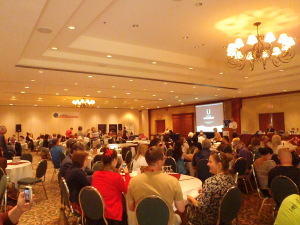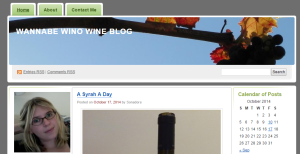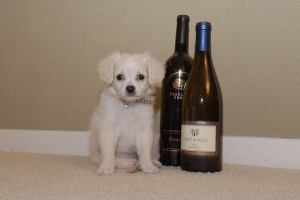What makes a wine blog influential? How do individual wine bloggers differentiate themselves from other wine bloggers? Do wine blogs even matter?
I recently stumbled across a really fascinating research study using sophisticated content analysis software to answer these and several other questions relating to the effectiveness, influence, and overall importance of wine blogs.
Since this type of content analysis of wine blogs hasn’t really been done in this great of detail, the researchers decided to limit their focus to what they considered were the top 5 english-speaking wine blogs. In order to be chosen for this analysis, there were several criteria that needed to be met:
- Blog must have been written in English.
- Target audience of the blog was the wine consumer.
- Blogs were updated at least once per month.
- Blogs were established at least 5 years ago.
- Blogs were single-authored.
- Blogs did not have a paid subscription component.
- Bloggers did not work for a winery or were they attached to any larger organization.
- The bloggers must have had some source of income other than their blog (at least until recently).
If the wine blog met these criteria, then they were considered “amateur” wine bloggers (despite what some

Wine bloggers at the 2013 Wine Bloggers Conference in Penticton, BC. Copyright R.Yeamans-Irwin 2013.
of them might actually consider themselves).
Based on these criteria, the 5 wine blogs chosen for this analysis were:
- Vinography (2004)
- 1WineDude (2007)
- Dr. Vino (2002)
- Wannabe Wino (2006)
- Benito’s Wine Reviews (2005)
In order to run a content analysis of these 5 wine blogs, the researchers used software called Leximancer. This software has been used many times previously for similar research, which allows the researcher to examine what the reader actually sees and not the perceptions of either the readers or the authors. The Leximancer software “conducts both thematic and relational analysis of the text based on Bayesian theory and learns as it analyzes the text, resulting in a concept map of the analyzed text, which shows the key themes present in the analyzed content linked by clusters of related concepts.” In non-run-on sentence terms, the software can effectively study the text of the blog and determine central themes and sub-themes that are most important to the blog and thus its influence. Leximancer is able to ignore pronouns and conjunctions, so we don’t have to worry about those types of things emerging as central themes when in fact they are not.
RESULTS
All 5 blogs differed somewhat, though there were strong overlaps between themes (duh, they all write about wine). Self-promotion was also a recurring theme among most of the wine blogs, indicating one possible mechanism for increasing their influence on readers.
The Broken Down Results Per Blog
- “Flavour”, “wine”, “tasting”, “adventures” and other flavor-related terms were central themes of the blog.
- “Legal terms” was also a strong theme of the blog.
- “Alder” was another major theme of the blog. This is the author’s name, indicating self-promotion.
- Researchers conclusions on Vinography:
- Vinography is a hedonistic blog, with a focus on the entire wine experience and not just how it tastes.
- This blog is very concerned with legal protection including the protection of the author’s intellectual property as well as the overall safety of the site.
- Self-promotion is a central theme of this blog.
- “Wine” and “find” were central themes to this blog, which related to other terms such as “red”, “tasting”, “learning”, “taste”, “year”, “winemaking”, “time” and “road”.
- “Interesting” was found to be an important theme in this blog, as well as the concept of lists.
- “1WineDude”, “blog”, “blogging”, “bloggers”, “Twitter”, and “review” were also common themes of this blog.
- Researchers conclusions on 1WineDude:
- Finding, learning, and tasting wines were found to be very important themes of 1WineDude.
- Using lists of wines is a commonly used method in this blog, as well as an apparent advanced knowledge of social media in terms of getting readers to interact with the blog.
- Self-promotion is a central theme of this blog, as well as the promotion of blogging in general.
- “Wine”, “wines”, “million”, “Vino” and the web address were central themes to this blog.
- “Million” was related to “tasting”, “wine”, and “wines”, highlighting the fact that there are a number of posts on this blog related to the financial worth and revenues of wineries.
- “Great” and “find” were themes tightly linked with “tasting” and “time”.
- Researchers conclusions on Dr. Vino:
- Self-promotion is a very important theme of Dr. Vino.
- Worth of wine and wineries is a common theme in this blog.
- This blog focuses primarily on the sensory experience of wines.
- The main themes for this blog were “wine”, “alcohol”, and “month”. These themes were related to other terms such as “great”, “mouth”, “glass”, “favorite”, “love”, “year”, and “night”.
- Related to “alcohol”, many actions words were tied, including “drinking”, “tasting”, “picked”, “tasted”, “think”, “clocked”, and “find”.
- “Sonadora” was another common theme on this blog (the author’s name). This term was tightly related to “post”, “month”, “wine”, and “blog”.
- Researchers conclusions on Wannabe Wino:
- The alcohol content of wines appears to be a very important concept on Wannabe Wino.
- Actions around alcohol are commonplace on this blog.
- Self-promotion as the author and authority on wine is a common theme on this blog.
- “Wine” was the most prevalent theme on this blog, and was linked more strongly to this blog than the other four blogs examined in this study. “Flavors” was also a common theme in this blog.
- There were many action words associated with this blog (i.e. “find”, “taste”, “think”, “found”), as well as many food-related terms (specifically; “sauce”).
- “Memphis” was a common theme in this blog, and is where the author of the blog is from. “Memphis” was tightly related to the concepts of “family”, “couple”, “local”, “people” and “home”.
- Researchers conclusions on Benito’s Wine Reviews:
- Wine flavor was the central theme of this blog, with the descriptions of wine written in terms of its taste.
- Food, wine-food pairing, and cooking with wine are all important aspects of this blog.
- This blog is least focused on self-promotion compared to the other four blogs, however, promotion of the blogger’s hometown (“Memphis”) was more important.
OVERALL CONCLUSIONS
In general, the results of this study indicated that influential wine blogs aren’t just about the wine in terms of its taste and flavor, but also incorporate the wine with storytelling and the larger experience of the encounter. All of the blogs try to make their posts more influential by tying the wines to actual life experiences.
Most of the blogs studied also incorporated a lot of self-promotion in their craft. With the ability of a reader to quickly bounce from one blog to another if they find one particularly dull, these 5 successful bloggers figured out (either consciously or accidentally) that it is key for them to quickly establish a presence online and to continuously reinforce their authority on the subject of wine throughout both their blog and through social media outlets.
While they all shared these similarities, all five blogs did differ wildly on how they actually reviewed the wines. There was seemingly no agreement in terms of technique and writing style between the five blogs, which shows an attempt by each blog to differentiate themselves from the other blogs and to provide a unique (and hopefully revisited) experience to the reader.
Overall, I thought this was a really fascinating study on how wine blogs can be successful and influential, and would be very interested to see similar studies done on a much larger scale. For example, the Wine Bloggers Conference has performed surveys on wine bloggers over the past few years (see: 2013 State of Wine Blogging Report), and it would be an interesting next step to add this next level of detail to that analysis. Instead of 5 wine blogs, there would be hundreds in the analysis. How do common themes relate to the success or failure of wine blogs? How do these themes relate to the wealth of information gathered in the State of Wine Blogging Report (if at all)? What about those wine blogs of a more technical nature not aimed necessarily at the consumer (*cough*, The Academic Wino? *cough*cough*)?
From this preliminary study, I think a few solid points can be made in terms of “how to run a successful wine blog”. Of course, due to the small number of blogs analyzed we could be missing some important strategies performed by other successful wine blogs, but I think at the very least the following points could potentially help boost a wine bloggers’ readership and credibility:
- Don’t just describe the wine. Tell a story. Hit the reader right in the feels. Make it an
experience and not just a description.
- Carve your own niche and find a way to differentiate yourself from all the other wine blogs out there. You are all writing about wine, so how can you stand out from the hundreds of thousands of others writing about the same topic?
- Self-promote: A nice balanced way anyway. You don’t want to be all “me me me, I’m the best at everything” and end up looking like a jerk, but instead be smart about it. The more times a reader sees or hears the name of the blog or the author, the more likely that reader will remember it and come back. Having social media accounts tied to the blog help tremendously, as it is a common pathway for incoming traffic that has proved to be successful over and over again.
I think using the Leximancer or similar statistical software analysis to discover how wine blogs are built and how they create and maintain credibility among the industry and the consumer is a really interesting idea, and I would like to see more research emerge from this. A long-term study monitoring the birth, growth, and death of a wine blog would be fascinating – does the overall theme or style of the blog change? Does something change in the reader that is not accompanied by an answer to this change by the blogger? How can wine blogs remain successful and relevant in an ever evolving technological world?
I’d love to hear what you all think of this study. Please feel free to leave your comments and discuss!
Further Reading:
2013 State of Wine Blogging Report



14 comments for “An Analysis of Influential Wine Blogs: Common Themes for Success”